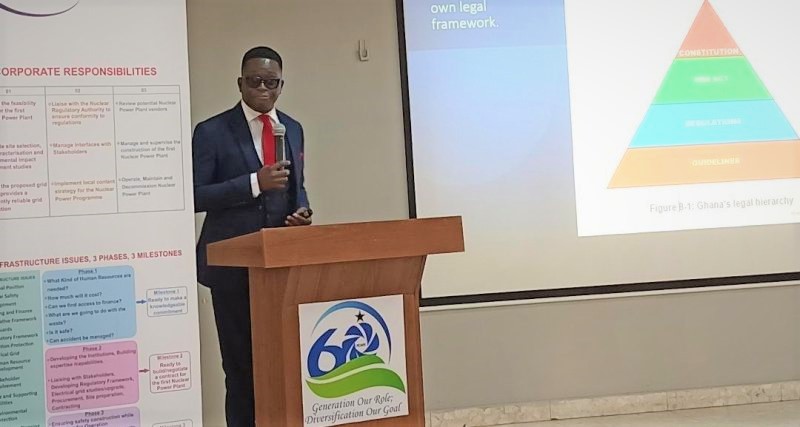Ghana has ratified all the 12 international treaties set by the International Atomic Energy Agency (IAEA), governing the implementation of a nuclear power programme, Mr Franklin Addai, Legal Advisor, Nuclear Power Ghana (NPG), has revealed.
The treaties include the Convention on Early Notification of a Nuclear Accident; Convention on Assistance in the Case of Nuclear Accident or Radiological Emergency; Convention on Nuclear Safety; Convention on Physical Protection of Nuclear Material; Vienna Convention on Civil Liability for Nuclear Damage, and the Comprehensive Safety Standards Agreement.
These conventions and other legal frameworks, such as the Nuclear Regulatory Act (Act 895) exist to promote the safe and peaceful uses of nuclear energy, Mr Addai said at a workshop for selected media professionals in Accra.
He said unlike other countries such as Serbia and Italy, whose constitutions prohibited nuclear power, Ghana’s constitution supported the addition of nuclear power to the country’s energy mix.
“The ratification of these treaties shows how serious and determined we are as a country to pursue this nuclear programme.
“Because of the potential danger, that is why the IAEA requires that interested countries ratify the various international treaties and put the necessary measures in place so that we can use nuclear in a peaceful and safer manner,“ he said.
Mr Addai said the NPG was working towards the enactment of additional laws to augment the existing legislation to ensure that the country had a robust legal framework that covered all aspects of the nuclear programme.

The Government, in recent years, has intensified efforts to add nuclear power to the country’s energy mix – and the target is to establish the first nuclear power plant by 2030.
The NPG, established in 2018 to champion the country’s nuclear power programme, is undertaking feasibility studies to meet the 2030 target.
Ghana’s population is projected to grow to about 38 million by 2030. It is expected that residential and industrial demand for electricity will increase at the same time.
This has necessitated the need for the country to explore sustainable options to generate affordable electricity to meet the expected demand.
It is also in line with the country’s quest to increase power generation while reducing emissions.
Addressing the opening of the workshop, Dr Stephen Yamoah, Executive Director, NPG, revealed that 15 vendors from different countries had expressed interest in partnering the NPG to establish the country’s first Nuclear Power Plant.
He said they were evaluating the proposals and a report would be submitted to the Minister of Energy for action.
The NPG has successfully completed the first phase of implementation and that the second phase, which involves the selection of the project site and vendors, is on course, he added.
Source: GNA (By Edward Acquah)

